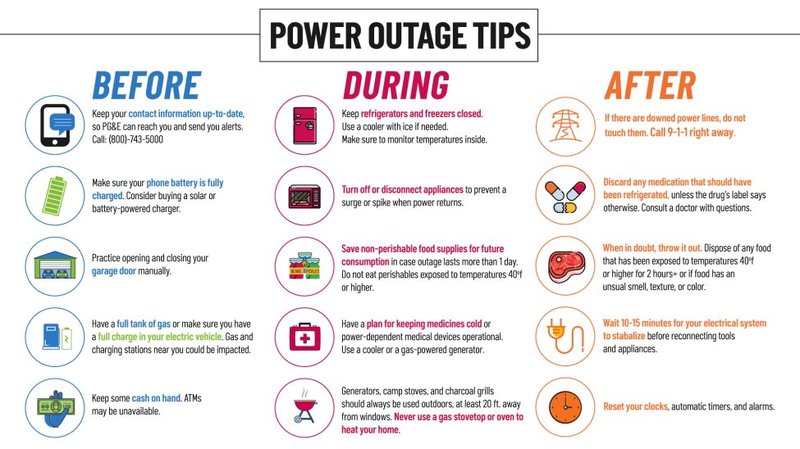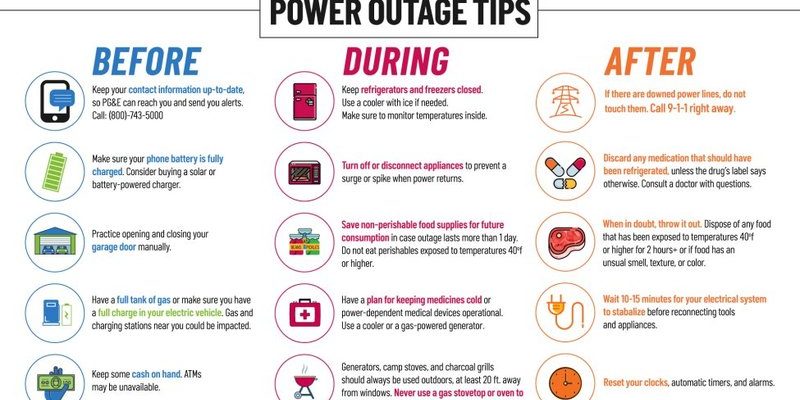
Power outages can happen for various reasons—from a storm knocking down power lines to equipment failures. Regardless of the cause, having a plan can help ease stress. Think of it like making your favorite dish; if you gather all your ingredients and tools beforehand, the cooking process becomes much smoother. So, let’s get started on what you can do when the power goes out in your area.
Stay Calm and Assess the Situation
First things first, when the power goes out, take a moment to breathe and assess your surroundings. Panicking will only make things worse. Look around to determine if your neighbors are also affected. If you see lights flickering in nearby homes, it might just be a momentary flicker.
Next, check if your cell phone or other battery-operated devices are still functional. You might think, “I’ll just hop on my phone to find information,” but if you don’t have power, you might not be able to charge it. So, make sure it’s charged, and keep it handy for updates or to reach loved ones if needed.
If you’re living in an area prone to outages, consider investing in a battery-operated radio. This can help you stay updated on the status of the outage while also providing entertainment.
Keeping Food Safe
One of the biggest concerns during a power outage is your food supply. If the outage lasts more than a couple of hours, you’ll need to consider whether your perishable items will stay safe. Here’s the deal: food in your refrigerator typically stays safe for about four hours, as long as you keep the door closed.
To help, here are some tips:
- Keep the Fridge Closed: Avoid opening the refrigerator or freezer as much as possible. Each time you open the door, cold air escapes, and the temperature rises.
- Know Your Time Limits: Perishable food like dairy, meats, and fish should be consumed or discarded if they’ve been above 40°F for more than two hours.
- Have a Backup Plan: If you know that outages are common, consider getting a small generator or cooler with ice packs to keep essential items cold in case of extended outages.
You might wonder, “What about freezer food?” Well, a full freezer can keep food frozen for approximately 48 hours if it remains unopened. That’s a great reason to keep your freezer stocked!
Using Alternative Light Sources
When the sun sets, and you’re left in darkness, light sources become critical. Flashlights are great, but if the batteries are dead, you might feel stuck. Instead of panicking, gather some alternative light sources from around your home:
- Candles: Always a classic, but use them cautiously! Make sure they’re on a stable surface and never leave them unattended.
- Battery-powered Lanterns: These are excellent for larger areas and can often last longer than traditional flashlights. They can create a warm atmosphere, too!
- Solar-powered Lights: If you have any outdoor solar lights, bring them inside to use during the outage. They can be surprisingly effective.
And hey, this might be a good time to practice some old-school skills, like storytelling or board games with family. Embrace the moment!
Staying Comfortable Without Heat or AC
If the power goes out during the sweltering summer or biting winter, temperatures may quickly become uncomfortable. Understanding how to keep yourself comfortable can help ease any tension.
During warmer weather:
1. Close Shades and Curtains: Keeping your windows covered can block out sunlight and help keep your home cooler.
2. Stay Hydrated: Drink plenty of water to stay cool. It’s easy to forget to hydrate when you’re focused on other things.
3. Take Advantage of Breezes: If it’s safe to do so, open windows to get a cross breeze moving through your home.
In colder months:
1. Layer Up: Put on extra clothing layers. Think of it like playing dress-up but for your comfort!
2. Bundle Up: Grab some blankets and cozy up with family members or pets; they can provide warmth, too.
3. Stay Active: If feasible, some light movement can help get your blood flowing and keep you warm.
These methods can help maintain a sense of normalcy while you wait out the outage.
Communicating and Getting Updates
During an outage, staying informed is key. Local authorities might provide updates on the cause and estimated restoration time. Here’s how you can keep in touch:
– Use Your Phone Wisely: If your phone has some battery left, check local news websites or social media for updates about the outage. You could also text friends or neighbors for information.
– Turn on the Radio: If you have a battery-operated radio, it’s a wonderful way to get news updates and stay connected with your community.
– Landline Phones: If you have a traditional landline, those usually work even without power. This can be a reliable way to reach someone if your cell phone dies.
Hearing updates can provide a sense of reassurance, helping you feel less cut off from the world.
Preparing for Future Outages
Once the power returns, take a moment to think about how you handled the outage. Preparation can reduce stress for the next event. Here are a few proactive steps you might consider:
– Create an Emergency Kit: Include essentials like flashlights, batteries, non-perishable snacks, water, and a first aid kit. Having these items at the ready can make a huge difference.
– Invest in a Generator: If power outages are frequent, a generator can keep essential appliances running—like your refrigerator or phone charger.
– Practice Outage Drills: Get your family involved in discussing what to do during an outage. You could even have drills to make sure everyone knows the plan.
Being proactive not only increases your comfort but also empowers your responses to unexpected outages.
Experiencing a power outage in zip code 46203 doesn’t have to be a daunting experience. By staying calm, preparing beforehand, and knowing what steps to take during the outage, you can navigate through the darkness with more ease. Remember to assess the situation, keep your food safe, find alternative light sources, stay comfortable, and stay informed.
And when the lights come back on, take a moment to appreciate that glow—even if it’s just from a warm lightbulb. Not only does it remind us of the conveniences we often overlook, but also of the community spirit that shines brightest during times of uncertainty. So go ahead, share your stories with neighbors or loved ones; after all, the best moments often come from the unexpected.
